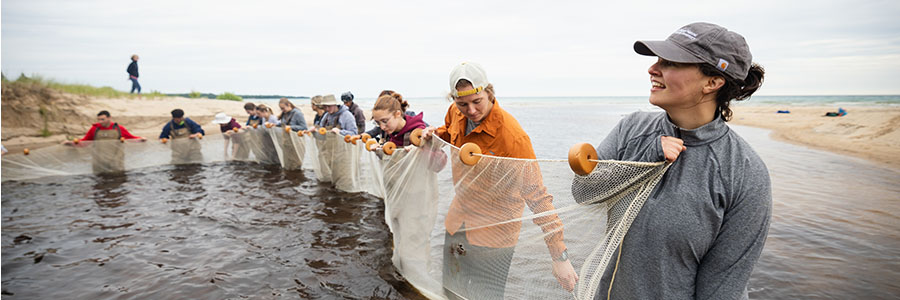
Priority two
Engage Communities — Cultivate and enrich reciprocal partnerships with university stakeholders to ensure a lasting impact in the communities we serve.
Objectives
- Champion the interests of rural and under-resourced populations through collaborations.
- Embrace and enhance the historic connection between the university and the Saginaw Chippewa Indian Tribe through active listening, cooperative partnering, and reciprocal learning to build on longstanding local connections and establish networks for broader collaboration with tribes across the Great Lakes region.
- Engage alumni, donors, community and business leaders, among others, to provide mutually beneficial real-world and hands-on experiences for students through curricular and co-curricular partnerships.
- Leverage and develop strengths of CMU with the needs and interests of our communities to build and sustain dynamic relationships.
SMART goals
- Develop strategies to identify and enhance relationships to meet community needs, beginning with healthcare and wellbeing in the mid-Michigan area, Great Lakes Bay Region, western and northern Michigan.
- Measure: Develop the plan, a comprehensive tracking process, and annual goals, by December 2025.
- Increase the number of students engaging in curricular and co-curricular real-world experiences with external stakeholders to achieve a long-term goal of 80% of undergraduate students.
- Measure: Identify a comprehensive list of the experiences, partners of engagement, transcript-based tracking mechanism, and communication plan to students and faculty by June 2025 for a Fall 2025 rollout.
2024 Progress
Successes
- Opened a physical location for CMU Innovation and Online and the CMU Rural Health Equity Institute at Traverse Connect in Traverse City, Michigan.
- Expanded the impact of CMURC through the Great Lakes Bay Region with a new Great Lakes Bay Small Business Hub.
- Increased access to teacher education (certification and ongoing professional development) in rural communities through the MiCAREER Resource Hub.
Ongoing efforts
- Identifying and collecting bids from consulting firms to perform unbiased needs analysis with communities served by CMU.
- Gathering information to develop a comprehensive list of community-wide immersive learning experiences and seeking mechanisms to track student participation in those programs.
CMU aims to remedy Michigan’s rural teacher shortage
Hiring and retaining certified teachers is a struggle for public schools across Michigan – especially those in rural settings.
With a new $15 million grant from the Michigan Department of Education, Central Michigan University will address that very issue through an innovative credentialing hub. The Michigan Consortium for Addressing Rural Education Expansion and Retention (MiCAREER) Resource Hub will offer teacher certification and ongoing professional learning opportunities at no cost to the future educator.
Through the MiCAREER Resource Hub, existing rural school staff who are not yet certified are eligible to work toward initial certification and ongoing professional learning. Prospective teachers also will be eligible.
“The need to attract, develop, and retain educators in rural regions is crucial for the health and well-being of children, families, communities, and our state,” said Paula Lancaster, dean of the College of Education and Human Services at CMU. “We are proud to lead collaborative efforts and build a truly unique consortium of educator preparation programs and preschool-12 school districts that will address the persistent problem of educator shortages in rural communities across our state.”
With rural school districts comprising 65% of the state’s school districts and 31% of its students, the hub’s impact will be far-reaching.
In a press release from the Michigan Department of Education, State Superintendent Michael F. Rice said, “Our rural school districts have faced a shortage of certified teachers because they are not located close to universities and colleges with educator licensing programs. Providing a no-cost credentialing hub will remove barriers to educator certificates for people who have talent and a passion for education but have not become certified due to geography and cost.”
CMU projects it will support hundreds of educators in the first few years of the hub’s operation, with the expectation for continued growth.
“At CMU, we measure our success by the impact we have on the people and communities we serve, and serving rural communities throughout the state is a key component of the university’s strategic plan,” Central Michigan University President Bob Davies said. “Hundreds of educators and thousands of students will benefit from the short- and long-term outcomes of this project. Our university was founded to help meet the state’s need for educators, and we are continuing that legacy today through the MiCAREER Resource Hub.”
CMU is the lead organization on the hub project. Lancaster is a co-principal investigator on the grant and, along with her colleague and interim director of educator preparation, Jillian Davidson, will oversee the launch of the hub. Kathryn Dirkin, faculty member in the Department of Teacher and Special Education, will oversee the project’s daily operations and key partnerships.
Lancaster said several other faculty members from CEHS will play key roles in the project, including Tracy Donohue, Troy Hicks and Gregg Dionne.
“Central Michigan University has been committed to teacher preparation and to serving rural schools since its inception in 1892. With this extraordinary commitment from the Governor and the State, CMU will lead the MiCAREER Resource Hub,” said Provost Nancy Mathews. “In collaboration with partners around the state, we are collectively dedicated to eliminating the persistent problem of educator shortages in rural communities across our state.”
Through the MiCAREER Resource Hub, CMU will expand its impact on the educator workforce by bringing together rural school districts and Michigan educator preparation institutions with experience supporting rural educator workforce needs. Among its partners are four additional state universities, at least nine northern Michigan intermediate school districts, and more than 50 local school districts.
Consortium partners will begin development of the hub in April. Lancaster said she expects programming will start no later than August.